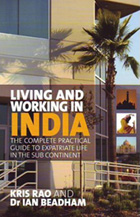
My friend Kris Rao’s new book Living and Working in India has just been released. If you have ever thought about working in India, this book gives you heaps of insights into how business works in India.
Unlike the western countries, Indian government has not placed any restrictions on foreign nationals working in India.
('foreign', especially 'western' credentials carry a lot of weight, with experience in the USA trumping that from other countries
Traditional Indian work environment has some remnants of the British Raj: detailed rules and responsibilities, and strict protocol while conducting business.
In general, Indian society respects seniority, and especially in the Indian academic world people are expected to 'respect their seniors' and 'juniors' may often be treated like servants.
Working hours in offices is generally between 35 to 40 hours. Hours worked in excess of the standard hours are generally paid at overtime rates. However, in certain sectors (IT, call centres, medical, etc ) you may be required to work unsociable hours or beyond office hours.
India does not have an equal opportunity act and the government jobs are reservation based (in terms of caste and religion).
Sounds not completely unlike corporations in the West! This would be an interesting read from a business practice/human resources perspective. As an up and coming economy, should and could India learn from the shortcomings of business practice in the West?
More excerpts from the book available on the author's blog.
All author royalties go to charity!